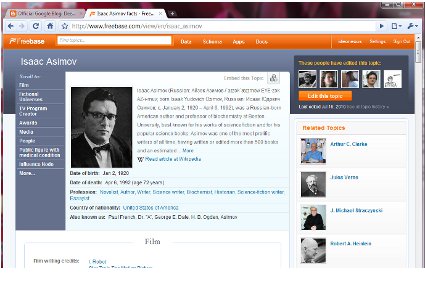With Google’s aquisition of Metaweb the searchopolis takes a stake in the seemingly-forever-emerging Semantic Web, a concept with endlessly verbose standards and few demonstrable applications for all it promises. I yawned when I read of Google’s move, remembering a few years ago when I explored Freebase, Metaweb’s semantic database. I even tried downloading and playing with their semantically-rich database version of Wikipedia… and was really unimpressed. It was 3GB of schemas, xml, and ontology, seeming to add up to little of practical value.
Was I ever wrong. I returned to the database this last weekend and found a community of several hundred users maintaining a browsable schema, with some of these volunteer ontologists having contributed millions of facts to the database the same way people devote thousands of hours to maintaining Wikipedia. On its surface, the database just seems like a bunch of web pages, you click through the associations as you would on Wikipedia, with articles and entries leading into each other in standard hypertext fashion.
Where the value of semantic associations comes into play is when you experiment with the Freebase Query Editor, where you can search for data in explicit detail, tailoring it to your specific needs. For example, with the following query I can get a list of computer scientists born before 1950:
[{
"b:type": "/computer/computer_scientist",
"date_of_birth": null,
"date_of_birth<=": "1950",
"education": [{
"institution": null,
"id": null
}],
"name": null,
"id": null,
"type": "/people/person"
}]
A slight modification, and we can restrict the list to just those scientists affiliated with Harvard:
[{
"b:type": "/computer/computer_scientist",
"date_of_birth": null,
"date_of_birth<=": "1950",
"education": [{
"institution": "Harvard University",
"id": null
}],
"name": null,
"id": null,
"type": "/people/person"
}]
This is a person-instigated search, but Freebase offers many ways for other applications to take advantage of its data. With REST services provided by Freebase, we can run JSON queries to inform our web applications like so:
Or, if you prefer XML, try Freebase's RDF Browser, where I queried for Isaac Asimov in RDF and got back a huge amount of semantic data. Currently the API only allows a measly 100kb of data downloading 100k of HTTP requests a day, but with Google's backing, this database could start providing semantically-rich data to applications all over the World Wide Web.
I know Google will keep it free, the company's business model is built entirely on the universe of free stuff online, and since most of the content in the database is fueled by Wikipedia, it's in the commons. I trust Google will increase Freebase's accessibility, making it so everyone can play mashup games with the data, just as they did with Google Maps. And, of course, Google will reap incredible benefits to the services they already provide with this acquisition, meaning it's a good time to invest in GOOG.

Comments
3 responses to “Google Aquires the Semantic Web, or Why Metaweb Matters”